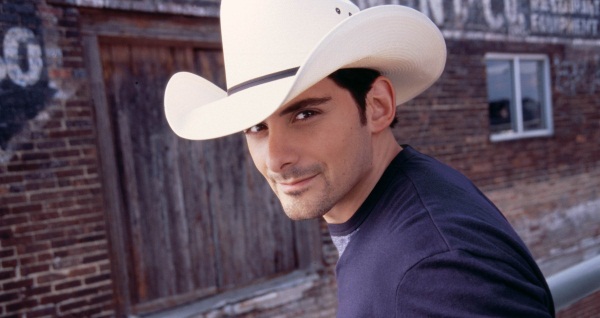Videos by American Songwriter
Country music is the most lyrically conversational of all song genres. Jazz and punk songs, for example, can rely on a more visceral and intuitive musical language to create their own universes, weaving both complex and simple musical themes in a flurry of saxophone notes or one power chord struck with authority. The interplay between Charlie Parker and Dizzy Gillespie’s horns is as colloquial as the call-and-response vocals of The Ramones, but neither completely live or die based on their conversational element. Country songs are different; instead of taking a simple theme and infusing it with a transcendent melodic motif or riotous energy, they more often tackle a complex issue and refine it to its simplest form, using intimate language most appropriate to a back porch rocker or beaten-up bar stool. If it can’t be said simply, it’s probably not country.
Brad Paisley’s “American Saturday Night” (co-written with Ashley Gorley and Kelly Lovelace) is exceptional because it expands the conversational parameters of country from their more traditional first or second person confines into full-on social commentary. The song takes the rather complex idea of the American Melting Pot and condenses it into an easily digestible ideal, not by simplifying the concept, but by illustrating it with a multitude of easily overlooked details, the tiny individual threads of the American way of life. The result is an impressive exercise in detail and rhyme scheme that is closer to Noel Coward and Cole Porter than Waylon Jennings. Observe:
She’s got Brazilian leather boots on the pedal of her German car
Listen to the Beatles singing back in the USSR
yeah she’s goin’ around the world tonight
but she ain’t leavin here
she’s just going to meet her boyfriend down at the street fair
It’s a French kiss, Italian ice
Spanish moss in the moonlight
just another American Saturday night
The trick here is convincing the listener to consider the Brazilian boots, German car, British band and the Soviet Union as things relevant to their lives, not just a list of deftly juxtaposed details that sing nicely. This happens in the third, fourth and fifth lines of the verse, where the writers attach the different elements to a character we all know well: A normal small-town girl going to a street fair. These lines could have been full of more cleverly laid out details, but Paisley and Co. wisely take a moment to root them in an image to which we can all easily relate.
But “American Saturday Night” doesn’t stop at telling the story of one girl. It actually uses the girl as a device to get us into the life of an entire town which, as it turns out, is full of even more details that support the central theme of the song:
There’s a big toga party tonight down at Delta Chi
they’ve got Canadian bacon on there pizza pie
they’ve got a cooler full of cold Coronas and Amstel light
It’s like were all livin’ in a big ol’ cup
just fire up the blender, mix it all up
After a second chorus, we are treated to a bridge that effectively sums the idea of the song up in a different way than the chorus is able:
You know everywhere there’s something there known for
Although usually it washes up on our shores
My great great great granddaddy stepped off of that ship
I bet he never ever dreamed we’d have all this
“American Saturday Night” is even more impressive in that, in the context of the current fears regarding immigration and the economy, it manages to be simultaneously reassuring and slightly subversive. My guess is that programmers at country radio might not have been totally enthusiastic about spinning a song that championed ethnic diversity. But Paisley circumvented this by turning a potentially fractious subject into something eloquently and triumphantly patriotic. On Music Row, these dichotomies do not occur very often. Paisley, Gorey and Lovelace deserve a lot of credit not only for writing a technically brilliant song but also reminding us that what we sometimes fear can be exactly what makes us stronger.













Leave a Reply
Only members can comment. Become a member. Already a member? Log in.